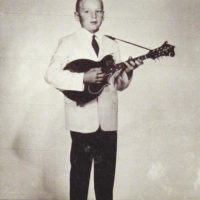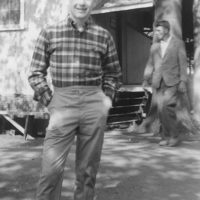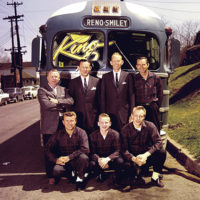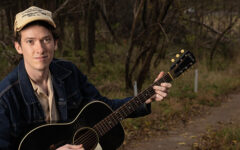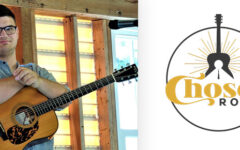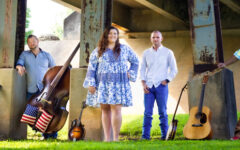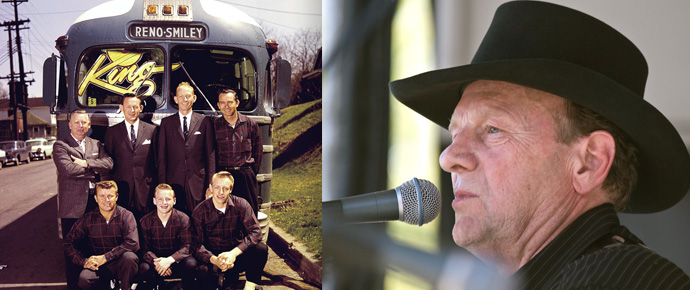
Following an invitation that the International Bluegrass Music Association (IBMA) extended to its members that they share a memory from “75 years of bluegrass,” we thought that we would collect a few to share with you.
Ronnie Reno is the eldest son of the late banjo legend Don Reno. He began performing with his father and Red Smiley at the age of seven, appearing on the The Old Dominion Barndance and recording with the duo for the first time when 11 years old. While playing mandolin for the Tennessee Cutups and attending to his requisite schooling, Ronnie Reno did some fill-in work with the Louvin Brothers, among others. Seeking to spread his artistic wings further, in 1968 he joined the Osborne Brothers, with whom he worked for about seven years, playing guitar and singing harmony vocals.
The Osborne Brothers were the CMA Vocal Group of the Year for 1971. Thereafter he spent eight years with country music star Merle Haggard, featuring on many of his Capitol recordings, among which were the classic hits like If We Make It through December, If We’re Not Back in Love by Monday, and Ramblin’ Fever. During this period Reno served as Haggard’s opening act; wrote several of Haggard’s cuts, including the hit I’ve Got a Darlin’ for a Wife; penned Conway Twitty’s smash hit Boogie Grass Band, and songs for many other artists, including Sammi Smith; toured with Mel Tills; worked as a session artist with Johnny Cash, Johnny Paycheck, Willie Nelson, and Leona Williams; had solo country music singles and an album; and appeared in the Clint Eastwood film Bronco Billy.
In 1984 he formed the Reno Brothers with brothers Dale and Don Wayne, recording six albums during the decade that they were together. Later he led The Reno Tradition releasing four CDs. Reno’s most recent CD is Lessons Learned (March 2015).
From 1993 Reno was heavily involved in television, serving as the producer of Reno’s Old-Time Music show, broadcast on the Americana Television Network, RFD-TV, and other networks; helping to launch new cable network Blue Highways TV in 2004, remaining with the company until 2014. His work in this field was recognised by the IBMA winning the Broadcaster of the Year Award for 2013.
He was honored with the IBMA Distinguished Achievement Award in 2006 and in 2016 he was made a member of the SPBGMA Preservation Hall of Greats.
Reno has served on the Board of Directors of the IBMA (for two terms), of the Bluegrass Music Hall of Fame & Museum in Owensboro, Kentucky, as well as the Kentucky Center for Traditional Music at Morehead State University.
Ronnie Reno, who was 13 years old at the time of the incident he shares below, produced Haggard’s The Bluegrass Sessions CD (released in 2007) and the Merle Haggard / Mac Wiseman Timeless album (2015). He retired in October 2019.
“This would have been early 1961… Reno and Smiley had just gotten their Greyhound GMC Silverside bus. Steve Chapman’s dad drove for Greyhound Bus Lines in Roanoke, and went to Kingsport with Red to pick out this bus that had seats in it and the Greyhound dog on the sides. I remember they put bunks in it and fixed it up like a motor home. The band had grown to six pieces with me, Steve, John, Mac, Dad and Red, and we needed more room to travel together. Now keep in mind, no one in the band had every driven a bus before, and really didn’t know much about it. I think Red went to diesel school, but had not driven a bus at all.
And now for the trip I will never forget. I think we were going to Rock Wood Hall in Warrenton, Virginia, for a Saturday night dance. To get to Warrenton you had to go through Charlottesville and up old Rt 29. Between Waynesboro and Charlottesville is Afton Mountain on Rt 250. On top on the mountain is the Blue Ridge Parkway, and we had to go up the mountain in second gear. Red was driving and had not changed many gears on the bus. It had a four-speed shift on the column and was hard to get in and out of gear. Years ago, many people thought you could save fuel by coasting downhill. That does not work in a bus.
When we got to the top on the mountain, I remember Red looking around and saying, ‘I’m going to save some money on fuel.’ He then kicked the bus out of gear, and we started down the long hills of the mountain. The bus had air brakes on it and if you use them too much, they will get hot and catch on fire. I remember Steve running back to the back of the bus and saying, ‘he’s going to kill us all.’ That really got my attention, and I immediately started smelling the air-breaks as Red started trying to slow the bus down.
By the time we got to the bottom we must have been going a 100 miles an hour. Fortunately, close to the bottom of the mountain the road had straightened out, but [it] was still a long way down. The breaks were almost on fire by the time we got stopped. Everyone was quite as a mouse with looks of horror on their faces. We started trying to get water out of the water tank in the back of the bus to put on the wheels of the bus. I never will forget we all got out of the bus and thanked the Lord that we made it down safely and could play some more music and love our families for years to come.
By the way, Red never again kicked the bus out of gear.”
Don Reno and Red Smiley at New River Ranch, Rising Sun, Maryland … June 18, 1961
The Tennessee Cutups are Mack Magaha (fiddle), Ronnie Reno (mandolin), Steve Chapman (guitar) and John Palmer (bass).
OK, readers, does this story trigger any thoughts of bluegrass music in days gone by? What related event would you like remembered? Please share in comments. Thanks.

